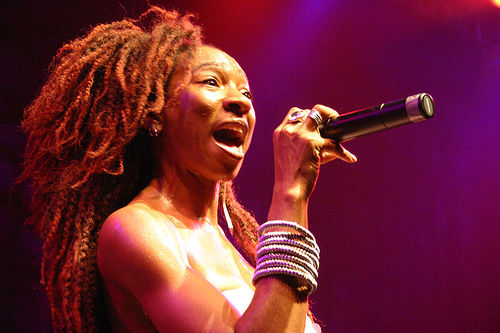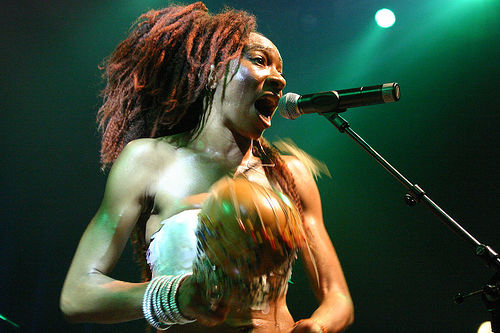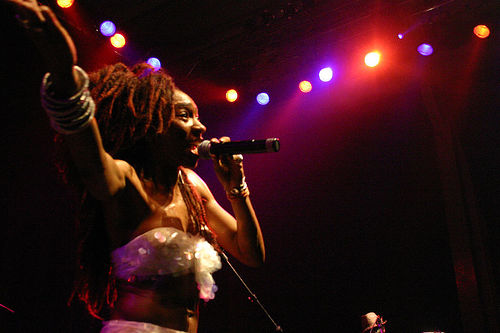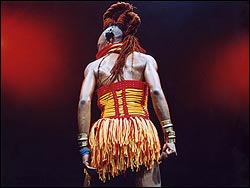WUNMI / “A.L.A.”

Ibiwunmi Omotayo Olufunke Olaiya. A BBC bio offers:
She was born in London to Nigerian parents who split up soon afterwards. At the tender age of four, she was sent to Lagos, where she spent the next ten years living with cousins. They may have turned her on to Fela Kuti’s Afrobeat revolution, which would later prove a crucial influence, but she always felt out of place there.
“I was always made to feel that because I wasn’t born there that there was something about me that was not quite right. It was like ‘wow I’m really a foreigner here’”, she explains. Arriving back in England at fourteen was also a shock: “I ended up feeling exactly the same thing again. And really it was at that point my identity started shifting, like…who am I?”
Craving attention, she retreated into a world of her imagination, finding expression in clothes, and in her later teens on the dance floors of London’s clubs, (“I find my oneness when I’m performing, when I’m dancing.”) where her unique solo style eventually caught the eye of Soul II Soul’s Jazzie B.
She danced with Soul II Soul and from there literally danced her way around the world. Then produced a host of collaborations: house, afrobeat, brokenbeat: three musical spheres—North America, Africa, Europe. Eventually Roy Ayers called her and mentored and encouraged her. Go for self, the self you are regardless of how complex the true you is, or as Wunmi states: “I had to get to love my voice, to accept my voice. That was the beginning of accepting completely me, really letting go of my past, my history, the pain of growing up in Nigeria, alone.”

I had seen clips of Wunmi performing. I had recordings on which she made guest appearances. Eventually—spring 2007—I coped her debut release, A.L.A. At first I wondered: why so much electronics on the bottom? Why not real drums?
You know if you say Africa, no matter how enlightened many of us may be, we still be looking for Tarzan to swing through, i.e. we be checking for the sound of jungle drums, be expecting the cliched image of Africa. No drums, well then, we think it can’t be Africa. Wunmi had the energy of Africa, the sun hotness but there was something else happening. I wondered about the elseness of her music.
Eventually, I came to grips with the neo-African propensity toward club music. It’s obvious. It’s dance music. Dance. (Cliché time—a truth so often stated it’s boring.) Africans love to dance.
Wunmi sho nuff loves to dance. Child would give a robot a heart attack trying to keep up with her. Not to mention, her style: hair and wardrobe announcing some other kind of ish. Way pass simple stylishness. Out past freakout-ville. There are no maps for where Wunmi goes to get her shit.
Heart of Africa. Head of Europe. She knows who she is and takes whatever she likes from what she ain’t. That messes with purists. But like she said, she been messed with all her life for not being just one thing. But why, why be one when you can be many? Evolution thrives on diversity. The fear of "the other" leads to barbarism and savagery. For those of us who are neo-African, fear of the other also leads to self-multilation.
Our African tongues were cut out once by civilization, do we really need to cut our colonialized tongues out our mouths too? Some would argue we should get rid of English, of French, Spanish and Portuguese. But after you have grown up with that how could you be yourself if you deny who you’ve been in the process of becoming who you are? And besides, isn’t multi-lingualism common for Africans?
Like notice hand-drum beats pushed up against a house electronic beat, that mash-up exemplifying the co-existence not just of acoustic/electronic, nor just African/European, nor even only female/male, but rather exemplifying all of that, exemplifying that we can put it all together, pull together differences that have often been mischaracterized as opposites. But you see as Wunmi demonstrates: difference don’t have to be opposition even though the mashups might not be to everyone’s taste.
I’m saying: Wunmi’s music is no comfort to those of us confused by a desire for a purity that can never be and, more importantly, for post-colonial us, never was. So when Wunmi says be yourself, she means be all the selves you are, rather than one romantic self to the exclusion of the reality of a composite self. Hence the house song “Free Your Mind” is an anthem, is a continuation of waving high what brother Jimi called the “freak flag.”

The enemies of self are often as close as our own inhales and exhales. We are sometimes (too often) at war with ourselves. Wunmi’s music is the soundtrack for embracing contradictions, embracing our organic chaos, for making a compost pile out of our mulatto-histories, and growing Black and strong out of the mélange of diverse roots and influences.
Which brings us to “Talk Talk Talk.” Listen to sisterlove talk about over-talking, how everyone is talking, no one is listening. A true afrobeat on the bottom (listen to how she does the Fela-inspired low notes). There is a freedom in her sound, a use of mouth sounds as rhythm. She is so tight in the mix you could easily miss her vocal work thinking that it is an instrument, but listen closely. Wunmi definitely got a drum in her mouth.
Then comes a 2003 Bugz In The Attic mix of Fela’s “Zombie,” the famous song Fela wrote after Nigerian soldiers ransacked, raped (literally all the women) and pillaged the Shrine, Fela’s compound in Lagos. This English-language brokenbeat/afrobeat dance floor counter-attack against the attackers is a remix of a song featured on the Red Hot series Fela tribute.
“Crossover (Commercialism)” is a confrontation with conformity. Or as Wunmi says: "I don’t think I want to be where you are." Funny thing about this cut, it’s almost all electronic, i.e. commercial-oriented even as it denounces commercialism.
“Illegal Alien” sounds like something Zap Mama would drop except for that blues harp. The way the chorus sounds, the arc of the lead voices—of course, it’s all Wunmi singing, I’m just offering a reference to help us appreciate that Wunmi is doing a bit more than simply talk-singing. And beyond the aesthetics, the song is hard political statement framed in the personal plight of those who are dubbed illegal by the descendants of slave masters.
“Interlude” is a little gem of a mix with Wunmi meditating out loud on the isolation of being a frontliner. “It’s all about that. The process. How to cope with being alone.”
Then comes “Woman Child,” a beautiful neo-blues talking about the deep-ti-tude of “secondhand pain.” Electro washes swirling over mid-tempo percussion. “It is our turn to make a change.” Well, well.
“Good Foot Charlie” is just bend over, bust-a-move, ass-shaking music. “Get on your feet and drop some moves” is the instruction. Form a circle and take turns doing your do.
We close with the title tune: “A.L.A.” Accurate self-description: African Living Abroad. Twenty-first century afrobeat. (Check that snare-drum, Tony Allen-like neo-shuffle beat.) Then those horn punctuations. Guitar vamps. And then the keys, just like Fela would do. And of course, the in your face lyrics. The self definition. Proud. To be an African living abroad. Proud to be herself. Beautiful. 
“We are not going to run away.” Going to stand. Be rooted in self. Go, Wunmi, go into the true heart of darkness. A gorgeous darkness. A dancing darkness. A conscious darkness. African living. In self. At home and abroad. At home living abroad.
—Kalamu ya Salaam
Another good find
Baba, you say, "Funny thing about this cut, it’s almost all electronic, i.e. commercial oriented even as it denounces commercialism." Also, you implied elsewhere that the mixing of hand-drums with electronic drums was a mix of African and European. Where do you get the idea that electronic music is inherently commercial or European?
When I think of electronic music like house and broken beat (two styles that Wunmi is using in her music), I certainly don't think of an attempt to be commercial or 'European.' (Whatever the latter adjective is supposed to mean. Do you simply mean music from the continent of Europe, regardless of the cultural background of the musician?) Both house and broken beat have been embraced by people of a wide variety of races and social backgrounds, but both styles are strongly rooted in black club culture. And on the commercialism angle, would you call an electronic-oriented group like 4Hero 'commercial'? What about Cinematic Orchestra? Suba? Theo Parrish? All of those are artists we've praised here at BoL, in part because of their focus on artistic expression as opposed to crass commercialism. I guess I don't understand where this "electronic equals commercial" thing is coming from, especially since most electronic musicians (and their fans) tend to be very non-conformist to popular trends and distinctly individualistic.
As for the tracks, I'm digging a lot of them. Wunmi's vocals aren't particularly distinctive, but I like her energy and style. "Good Foot Charlie" is like some unholy cram-session of Fela, James Brown and Newcleus. It's wilder than just about anything I usually listen to, but I'm liking it despite myself. "Crossover" is another good track. It's the kind of music I like to put on and zone out to. I like my club music with liberal amounts of soul and warmth. On "Crossover," Wunmi does a good job of warming up the metallic nature of the electronics. Also, it's on this track that you really hear the Afrobeat influence in Wunmi's music. The chorus sounds just like a Fela song. I'm kind of feeling the slower songs too, "Illegal Alien" and "Woman Child," but it's going to take me another few listens to decide if they're keepers or not. All in all, I like what Wunmi is doing. It's another good find, Baba.
—Mtume ya Salaam
Words, Words, Words
It's always great having Mtume as a writing partner. Why? Cause he will call me when I slack off and try to take shortcuts rather than thinking all the way through what I'm trying to say and finding the appropriate words to illuminate the point. So the "European" and "electronic" words, both of them are inexact and, as you accurately point out, a bit confusing if not outright misleading.
What I had meant to say was Occidental rather than European, meaning contemporary Western culture. The racial overtones of European are totally misleading and inexact. The thing is that when it comes to music, 20th century Occidental is eithe out and out black music or else is deeply influenced by black music. Yes, even (particularly!) 20th century classical music. All the masters acknowledged jazz and some elements of blues as inspiration. I'm talking about the Stravinsky's, the Dvorak's, the Philip Glass's, etc. etc., each and everyone of them. How else could it be?
Europe swallowed Africa and found itself changed from the inside out. Again, I don't mean racial elements. I'm talking culture. So that's one point: should say Occidental culture rather than Europe, and should be clear that Occidental music culture is indelibly marked by black music in both performance and production.
Which brings us to the electronics discussion. Again, I'm talking about two things at one time. First, the contemporary dance culture, particularly house music, techno, drum 'n' bass, broken beat, etc., all of that is obviously heavily influenced and informed by black music (which is music both of the continent and the diaspora). But beyond that the production techniques, ways of making music, the use of electronic instruments, well, always on the cutting edge and the most massive of influences are people like Sun Ra and Eddie Harris, Herbie Hancock and that whole turntable discussion we had a couple of months back. I'm not naming also-rans, these folk were originators, innovators. Sun Ra was using moog synthesizers before most musicians even knew what a synthesizer was. And don't get me started on hip hop and contemporary music production.
That said, the second part of what I was sloppily implying is that the electronic sound, the replacement of acoustic instruments by electronic instruments, the dj/producer production of beats rather than a live drummer, that sound is "the" contemporary sound of the majority of 21st century commercial music. But while the sound is the sound favored by commercial music, the origin of the sound and the production of the sound is not in and of itself commercial. Given the way I wrote it, Mtume, you are right, it sounded like I was equating electronic with commercial. That was both not what I meant and flat out wrong the way I wrote it. My bad.
Hopefully, this clears up the issue.
On another note: surprised you didn't mention "Zombie" in terms of afrobeat.
—Kalamu
This entry was posted on Sunday, October 28th, 2007 at 12:15 am and is filed under Contemporary. You can follow any responses to this entry through the RSS 2.0 feed. You can leave a response, or trackback from your own site.
One Response to “WUNMI / “A.L.A.””
November 4th, 2007 at 12:02 pm
Great Sunday Indeed! This forum, these conversations, these beats linking us together…
Amin/Amen! I love the discussion, love the sista, had the great pleasure to meet her and know her at the beginning of the present day journey. Love that she is walking a path for many of us neo-Africans… FYI there is also a group of DJ’s out of Dakar, Senegal, KoolGraoul who are also (musically) paving the rhythms of we, the hybrids…
Leave a Reply
| top |